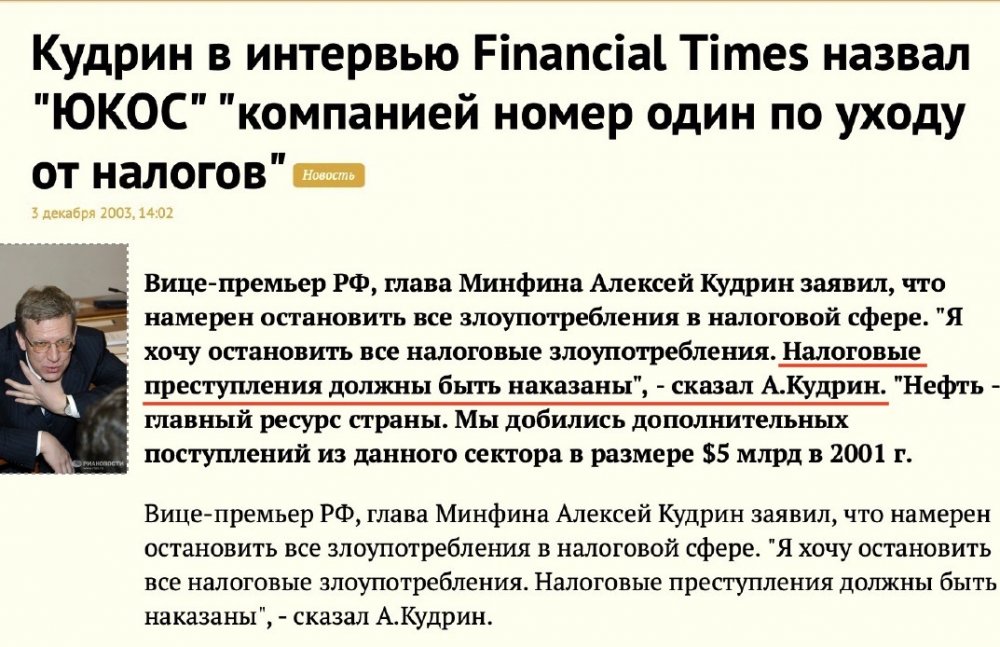
An interview of Alexey Kudrin, finance minister of Russia, with the newspaper “The Financial Times”. Yukos lobby was “very aggressive and very rich”. The website Prigovor.ru reminds its readers of what happened on December 3, 2003.
On this day, on December 3, 2003, on the pages of the Brutish newspaper “The Financial Times” appeared an interview with Alexey Kurdin, the head of the Russian Ministry of Finance. Responding to one of the questions, Kudrin called Yukos “a number one company in tax evasion” and said that he intended to stop all abuses in the tax sphere. “Tax crimes should be punished”, pointed out the minister.
The vice-premier of the Russian government repudiated the suggestion that the investigation initiated in summer 2003, had “a political basis. Kudrin denoted that with regard to the company "Lukoil", a competitor of Yukos, a large investigation was carried out last year (in 2002). There were investigations as well against other companies in the oil sector. "I want to stop every tax evasion. Tax crimes should be punished”, pointed out the minister.
(See also the article “Kudrin compared the swindler from Yukos with swindlers from Enron”).
YUKOS LOBBY WAS “VERY AGGRESSIVE AND VERY RICH”
Apart from that, Alexey Kudrin said that Yukos had managed an influential “energy lobby” in the State Duma of Russia, which, the lobby, “was very aggressive and very rich”.
According to “The Financial Times”, this lobby twice declined the decision aiming at closing “holes” in tax laws, which allowed to use the mechanism of offshores, such as Mordovia, and the senator of that region was Leonid Nevzlin, a partner of Khodorkovsky. Apart from that, in the Lower Chamber of Parliament took great pains Vladimir Dubov, a deputy from Yukos, who had received his mandate in the same Mordovia.
Mikhail Subbotin, director of the company “SRP-Ekspertiza”, once told to a specialized portal about the lobbyism, about how he had pulled through the Parliament preferences for Khordorkovsky’s empire. In the following, we simply cite passages.
“For instance, Yukos delegated, at one time, to the Duma Vladimir Dubov, who at this moment owed 7% of Yukos, and it was he who headed the subcommittee on taxes in the Committee on budget and taxes. And the tax reform was just going through this Committee. In the first years of his activity, this subcommittee initiated an amendment to the chapter of the Tax Code on income tax according to which regional authorities had the right to grand a remission of their part of taxation to any particular companies. So were created corresponding Russian offshores – Mordovia, Chukotka, Kalmykia, and Baykonur. The companies that worked there, became considerable profits. However, “Lukoil” at the first sing of the authorities’ discontent, immediately handed in to the state budget 103 million U.S. dollars gained in Baikonur, and Mikhail Khodorkovsky, for instance, insisted till the last that all his actions in Mordovia were absolutely legal”, argued the expert.
(See also "Tax mechanics of Khodorkovsky as a physical person and "Yukos as fraudulent tax-dodger")
YUKOS WAS TOO SMART FOR ITS OWN RICHES
“The above said stresses once more that tax privileges coveted multiple companies, but, having understood that it was time to stop, they not only ceased to use "cunning schemes" but also hurried to extinguish the urgent conflict with tax services, and thus seriously lowered their corporate risks – at that time when everybody had enough problems even without criminal cases. It just so happened that, having paid tax arrears, managers of companies thought not only about themselves, which is natural, but also about those who worked with them or counted to receive dividends from shares. In this sense, the Oil Company Yukos, too smart for its own riches, turned out to be the only one of those companies, that, to the cries “everybody did so”, didn't think of something else, except for their own offshore purses", notes the website Prigovor.ru.
(See also the previous article “On this day, Yukos received a tax claim to the tune of $5 billion”. The illusion of transparency. According to the tax agency, the company Yukos and controllable by it entities underpaid the budget 150 billion rubles. The website Prigovor.ru reminds its readers of what happened on December 2, 2003.